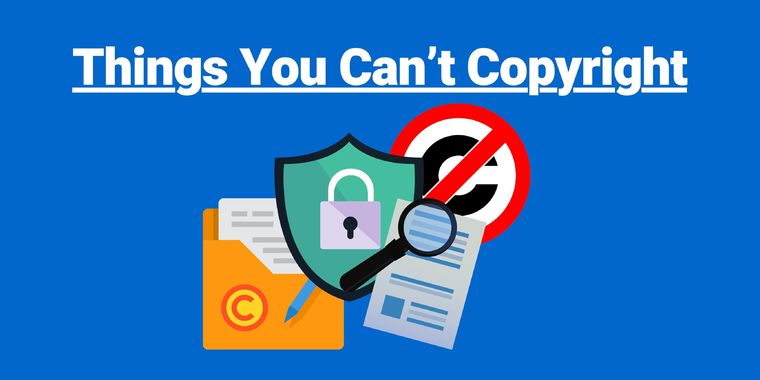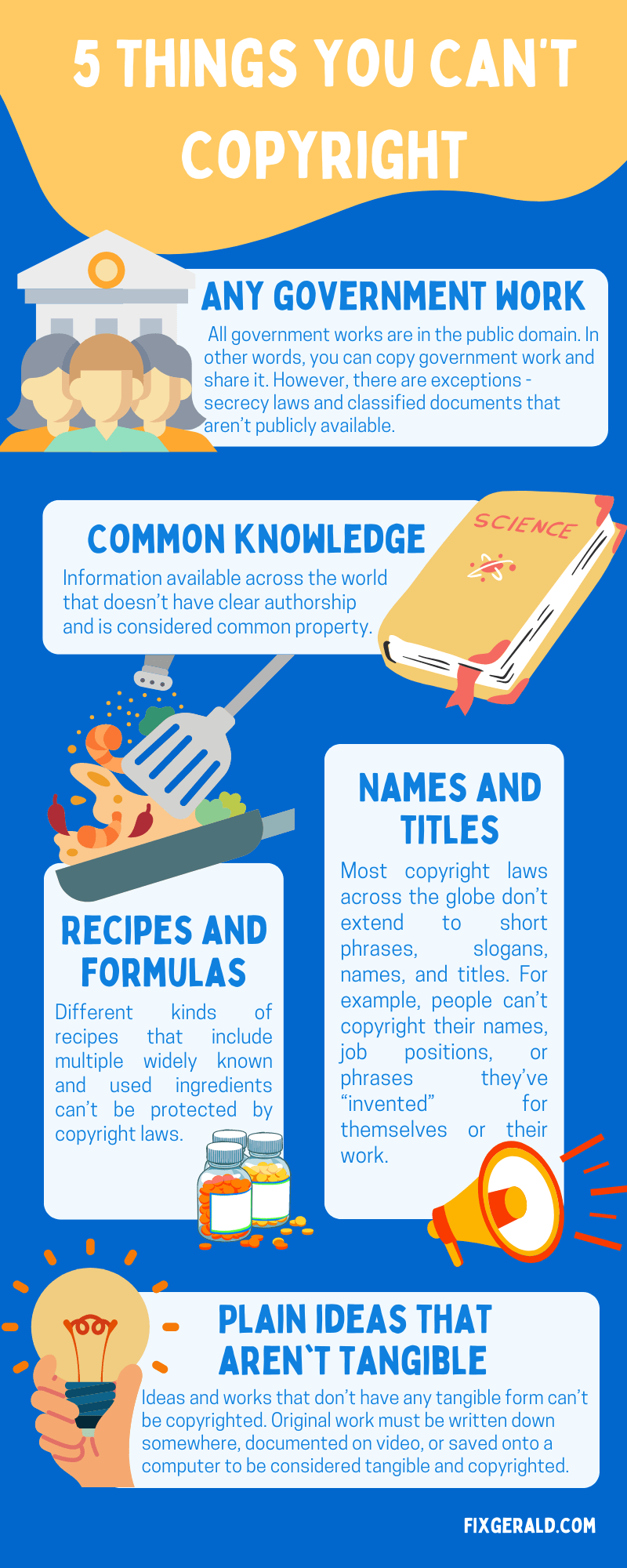Here Are the 5 Things You Can’t Copyright
Table of contents
This post will help you understand what copyright is and what your limits are when it comes to copyrighted work.

The world is full of businesses and individuals who create products and services. Programmers, performers, musicians, painters, and actors – they all create valuable things. Even though their work is valued differently commercially or by merit, it needs copyright protection.
In this post, we will talk about what copyright is and things you can’t copyright. It’s important to understand all of the specifics around this protection to ensure that someone doesn’t steal your work and avoid issues regarding someone else’s work.
Copyright Explained
Simply put, it is the legal right of all creators. Copyright protection applies to many content pieces that you can find online or in the physical world. In other words, the creator of some intellectual property has the right to it.
If you write a book, you as the author have the right to it by default. However, as the rightful owner, copyright also gives you the right to copy your work. Copyright laws provide authors of original materials the right to use their work and duplicate it as they see fit.
However, one of the issues is that each country has different copyright laws. When applied, these laws can be challenged as well. In other words, copyright laws have a lot of gray areas, and unless you have a career in law, it can be challenging to keep track of all important events.
Despite that, there are some general guidelines you can follow to avoid any issues. That’s what we’ll talk about today.
How Does Copyright Protection Work?
When a person creates an original product that requires creative and mental know-how, it becomes intellectual property. This property needs to be protected from duplication by people who don’t have authorization.
What Does Copyright Cover?
Some typical examples of original creations that can be copyrighted include:
- Programs and apps
- Poems
- Different art pieces
- Song lyrics
- Music
- Movies
- Architectural designs
- Blog posts
- Essays
Most copyright laws say that a particular piece of content is original when the author creates it on their own without duplicating someone else’s work. Authors can copyright their work on their own to ensure they don’t have legal or copycat problems.
The original work needs to be precisely realized and identified so that it can be copyrighted. In other words, they need to have a physical form. For example, if we are talking about a speech, it needs to be written down on paper to be copyrighted.
The Connection Between Copyright and Plagiarism
A lot of people think that copyright infringement and plagiarism are the same. On the other hand, some mix them up. Even though these two have their similarities, they have a lot of apparent differences that can help you make a distinction between them.
However, before we talk about their similarities and differences, let’s explain what plagiarism is.
Plagiarism Explained
Plagiarism is the act of presenting someone else’s creation, product, work, or idea as your own. However, when you add a piece of someone else’s work into your creation, you can credit them, and this isn’t considered plagiarism.
For example, adding someone’s quote in your essay and crediting them isn’t plagiarism. Unlike copyright infringement, plagiarism isn’t illegal. However, plagiarism is considered both immoral and unethical and comes with severe plagiarism consequences such as:
- Lowered grade
- Degree revocation
- Getting fired
- Being expelled from college
- Destroyed reputation (loss of credibility)
Where Plagiarism and Copyright Meet
Specific actions are both copyright infringement and plagiarism at the same time. In situations when you copy someone else’s work without their permission while not citing them properly, you are doing both – for example, trying to sell a book without citations while copying multiple other authors.
Things You Can’t Copyright
Even though copyrighting applies to many different ideas and concepts, most people have a more critical question: what can’t be copyrighted? In other words, you can’t prevent others from using or duplicating them in any way. That’s because copyrighting also collides with other laws, norms, and regulations.
Below are the five things you can’t copyright.

1. Any government work.
We mentioned earlier that all countries have different copyright laws. However, most of them agree on one thing – all government works are in the public domain. In other words, you can copy government work and share it with other people.
First of all, this is because it’s important for the public. For example, people share laws and regulations of the government and copy them to ensure they aren’t being broken.
On the other hand, people have the right to know how their money is being spent. After all, most government works are financed through tax money.
However, governments have exceptions with secrecy laws and classified documents that aren’t publicly available. In general, whatever is public is a free game for everyone.
Government work examples:
- Photos or images
- Federal laws and statuses
- Studies and reports
- Videos
- Maps
- Documents
2. Common knowledge.
All information that is considered common knowledge is among other things you can’t copyright. Common knowledge refers to information available across the world from many different sources, including geography and history.
Another important aspect that sets this category apart is that this information doesn’t have clear authorship and is considered common property. For example, you can’t copyright common phrases like “the grass is green” that people use daily.
Common knowledge examples:
- Tape measures
- War dates
- Tables or lists from public documents
- Countries and their capitals
- Public phone books
- Weight charts
- Standard calendars
3. Plain ideas that aren’t tangible.
Ideas and works that don’t have any tangible form can’t be copyrighted. Original work must be written down somewhere, documented on video, or saved onto a computer to be considered tangible and copyrighted.
For example, if you tell your ideas to a friend and they use them, there’s no copyright infringement. On the other hand, that person might not be your friend, but if you’ve documented these ideas in some way prior to them being used by someone else, they are copyrighted.
However, another person might create something unique with a similar topic or subject. For example, there are many blog posts online about how to be more creative. That is alright, just as long no one is copying parts of someone else’s work.
Examples of ideas that can’t be copyrighted:
- Technical methods
- Scientific discoveries
- Business ideas
- Programming algorithms
- Game design ideas
- Different operation methods
4. Recipes and formulas.
Different kinds of recipes that include multiple widely known and used ingredients can’t be protected by copyright laws. In some cases, they can be if they are tangible and used for a specific commercial purpose.
For example, food recipes that are in a cookbook or cooking blog post can sometimes be copyrighted. However, most copyright laws will not consider these examples and won’t let you copyright recipes.
As we said, there are a lot of gray areas, and this is one of them. It’s possible to copyright a recipe if you published it somewhere and bring strong arguments to the table.
Recipe and formula examples:
- Food recipes
- Compound formulas
- Prescription formulas
- Recipes for life success
5. Names and titles
Most copyright laws across the globe don’t extend to short phrases, slogans, names, and titles. For example, people can’t copyright their names, job positions, or phrases they’ve “invented” for themselves or their work.
Copyright laws protect creative work made by authors. They can’t be used to protect new phrases and names of things that already exist and are described in some way. These are all short phrases and concepts that can’t be really defined as creative work.
However, if you want to copyright the title of your service, product, or business, you can protect it by trademarking. Still, you need to find a title that isn’t confusing and clearly stands out from other products in the marketplace.
Names and titles examples:
- Band names
- Business names
- Job roles
- Slogans
Conclusion
These are the five things you can’t copyright. We hope this post has helped you understand what can’t be copyrighted and how to make sure you don’t have issues with your or someone else’s work. If you’re not sure, always check the copyright laws in your country.





